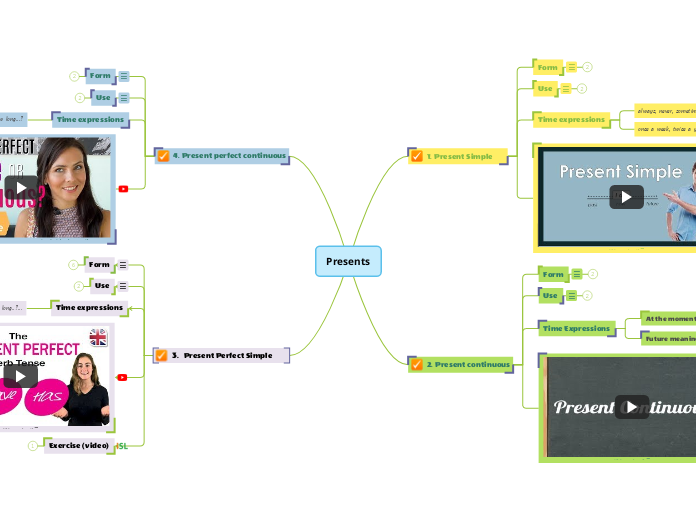door Mª Ángeles Escalera 2 jaren geleden
292
Presents
The present continuous tense is used to describe activities happening at the moment of speaking, such as "I'm just leaving work." It also covers future plans or arrangements, like "

door Mª Ángeles Escalera 2 jaren geleden
292

Meer zoals dit
Present perfect simple. Uses:
1.To express situations that started in the past and are still true (since/ for)
I have known James for 5 years.
I have known him since 2017
2. To describe recently finished actions which are important now
I have bad news. I have lost my job.
3. To express things you have done in your life.
I have been to Thailand and Indonesia.
4- To express the number of times you have done something.
We have called you three times
5.With unfinished time periods (so far, until now, today…).
I haven´t read the newspaper today
6.With superlatives and expressions like “this is the first / second/ best/worst…”
This is the most beautiful house I have ever seen
7.To announce recent news (information)
I regret to announce that the match has been put off.
PRESENT PERFECT. FORM:
Present of "to have" + participio = have/has + participio
1. Affirmative Sentences
I have gone to work
She has gone to work
We have been to London
They have learned English.
2. Negative Sentences
I haven’t talked to Peter
She hasn’t gone to work
We haven’t been to London
They haven’t learned English.
3. Interrogative Sentences
Have you talked to Peter?
Has she gone to work?
Have you been to London?
Have they learned English?
for, since, already, yet, just, ever, never, lately, how long..?...
PRESENT PERFECT CONTINUOUS. USES:
1. Action that began in the past and continues up to the present (with an emphasis on duration):
I have been waiting for two hours!
2. A long action that began in the past and has just finishes, but the results are still obvious:
We have been working for 10 hours. That´s why we are so tired.
PRESENT PERFECT CONTINUOUS. FORM
Positive
I have been working
You have been working
He/she/it has been working
We have been working
You have been working
They have been working
Negative
I have not been working
You have not been working
He/She/it has not been working
We have not been working
You have not been working
They have not been working
Questions
Have I been working?
Have you been working?
Has he/she/it been working?
Have we been working?
Have you been working?
Have they been working?
PRESENT CONTINUOUS. USES:
1.activities at the moment of speaking:
I'm just leaving work. I'll be home in an hour.
2.future plans or arrangements:
Mary is going to a new school next term.
3.something happening before and after a specific time:
At eight o'clock we are usually having breakfast.
4.something which we think is temporary:
Michael is at university. He's studying history.
5.Something which is changing, growing or developing:
The children are growing up quickly.
6.something which happens again and again and is annoying -with always, forever, constantly-:
It's always raining in London.
PRESENT CONTINUOUS. FORM:
Present of "to be" + vb –ing = am/ is/ are + vb-ing
Positive Negative Questions
I am working I am not working Am I working?
You are playing You are not playing Are you playing?
He, she, it is talking He is talking Is he talking?
We are staying We are not staying Are we staying?
You are studying You are not studying Are you studying?
They are sleeping They are not sleeping Are they sleeping?
1.For general truths
2.For habits / repeated actions or events
He drinks tea at breakfast.
It rains every afternoon in the hot season.
3.For permanent situations:
He works for IBM
4.For fixed arrangements / schedules
His mother arrives tomorrow.
The trains arrives at 5:30
5.With future constructions (With "before, after, when...)
She'll see you before she leaves.
We'll give it to her when she arrives.
6.For instructions
You take the No.6 bus to Watney and then the No.10 to Bedford.
7.For formal announcements
We regret to inform that there are no more positions available at the moment.
8.With stative verbs*:
I love you
*Stative verbs:
Simple present
Positive Negative Questions
I eat I do not eat Do I eat?
You eat You do not eat Do you eat?
He, she,it eats He does not eat Does he eat?
We eat We do not eat Do weI eat?
You eat You do not eat Do you eat?
They eat They do not eat Do they eat?
Spelling (he, she, it):
For most verbs we add -s to the base form to make the she, he, it (third person singular) form.
· When the verb ends in -ch, -ss, -sh, -x or -zz, we add -es.
- Watch → watches Miss → misses
· When the verb ends in a consonant + -y we change y to i and add -es.
- Hurry → hurries - Study →studies
· But when the verb ends in a vowel + -y we just add -s.
Pay → pays
When the verb ends in –o we add – es
· Go → goes Do → does